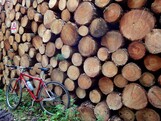 I was enjoying a little “girl time” this weekend with some friends while camping. We left the guys to entertain the small posse of children while we took the dog and did a little hike. No one whined! It was amazing! On the ride to the coffee shop afterwards (cause … no kids!), the topic of health habits came up. I was asked to chime in regarding their questions regarding some different tactics they had tried. None of them were bad ideas really, but none of them had stuck. It felt to me like everything they had tried was a little on the extreme side. As an example, one woman talked about how difficult it was for her to make two different meals to satisfy the different dietary needs of the family. So, that all led to a little discussion about habit stacking. I encouraged them to consider making one smallish change. One that doesn’t rock their world and feels very doable long term. Over time, that change will become a little bit more normal. Then it’s time to choose the next small change. Rinse and repeat. It’s not a quick fix, but by golly, over time you may just find you have done a major overhaul of your health habits by taking one small do-able step at a time!
0 Comments
 Not only am I having fun with starting my own private health coaching business, but others see what I am doing and want to support me! I have never seen myself as an entrepreneur, but it seems I’m a pretty quick study when I put my mind to it. Ladies and gentleman, this is the blog post of a recent recipient of a Level Up Mini Grant! I found out about the grant through my involvement with the West Virginia Women’s Buisness Center and applied. After completing a relatively short application and submitting a “Lean Canvas,” which I learned is basically a short and sweet business plan, I was notified that I was awarded the grant! The grant will allow me to “Level Up” my business by providing the funds for certifications and for computer programs. I’m looking forward to taking the exam to become a National Board Certified Health and Wellness Coach. The grant will also be used for continuing education that will serve to grow my skills and knowledge as a coach. Also, I have already been experimenting with the free version of an online platform called Healthie to use as an interface for my coaching clients. It has been fun to play with the features that help me leverage my time with tasks such as billing, note taking, form intake, and scheduling. It has also been fun for my clients to use the goal setting tools and reminders and the video chat feature. I look forward to providing even more services as I use the grant to access even more features of the program. Thank you so much to the West Virginia Women’s Business Center and Partner Community Capital for believing in me and helping equip me to take my business to the next level! 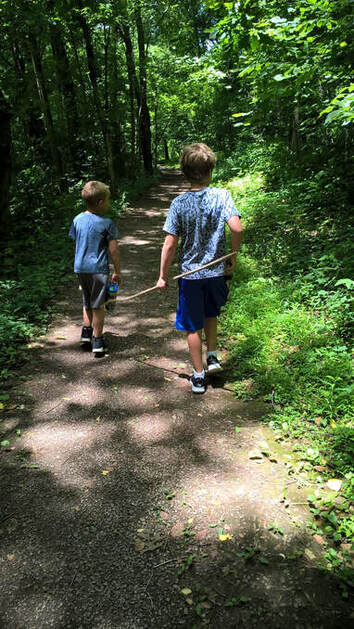 There are a lot of ideas out there on what it takes to change a habit. Most people are familiar with the thought that if you do something for 30 days, it will then be a habit. I don’t necessarily disagree, but I think there is a lot more to it than that. And the danger in that concept is that if you miss a day, you are back to square 1 … which for a lot of people is enough to send them into a tailspin. (I’m a failure … I’ll never get this right … etc. Been there?!) The way I explain habit development to clients is using the analogy of a hiking trail in the woods. Imagine that like Anne of Green Gables, you have a trail through the woods that links your house with that of your best friend. That trail has been there for years and because you spend every day with your friend, it is nice and clear. Suppose one day you decide that you want to make a new trail so that you can walk past a particular berry bush on your way to your friend’s place. The first time you go that way it is going to be very difficult. You will have to do a lot of work to clear the new trail. But the more often you take that trail, the more clear and packed down it will become. The old trail is still there, but every day it becomes more overgrown because you aren’t walking down it. If you do take the old trail one day, it doesn’t mean your new one is totally gone. You just want to get back to the new one to continue the process of making the new trail wider, more packed down, and easier to travel. And by traveling the new trail more often, you are also letting the old trail become more overgrown and forgotten. This is literally what is happening with the neurons in your brain as you are establishing a new habit. New pathways are being built that make it easier to do the new habit each time. And concurrently, the old pathways are being forgotten. If you slip into your old pattern one day, you simply need to get back to the new one the next time. It is still there! And, it gets easier every time you do it. What new habits are you developing new neural pathways for? Comment below! BJ Fogg coined the term "Tiny Habits" and he describes the concept and his reasearch in his short video below. I love helping people incorporate some of these principles into their health journeys in our coaching calls. What "Tiny Habits" are you inspired to begin after watching his video? 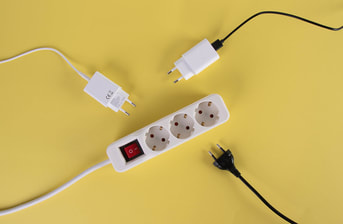 One of the very first things I hear from coaching clients when they have started to make health habit changes is “I have so much more energy!” This happens regardless of whether their ultimate goal is weight loss or to get off cholesterol medication or anything else. Before they see any measurable numbers change, they can tell that something new is happening in their bodies. It is so encouraging! And a lovely side effect is that with their new-found energy, they often find they have the capacity now to take their new health habits to an even higher level … resulting in more energy and greater health … and the snowball continues! Because of this, I developed a 7 Day Energy Reboot Program. Each day has a few simple and quick ideas of ways to incorporate one of the 7 Energy Reboot principles. Participants in the program can choose one of the ideas or a different one that they come up with after considering the suggestions provided. Where would you rate your energy level on a scale of 1-10? If your energy was a 10, what would you be able to accomplish that you aren’t now? Are you ready to commit to less than 15 minutes a day for 1 week to start the energy snowball effect? If so, send me a quick email at katiekolb81@gmail.com or text me your email address to 304-680-7773 and request my 7 Day Energy Reboot. I’ll send it for free ($5 value) as a thanks for reading my blog! If you’d like to participate in the 7 Day Energy Reboot in a guided group, I lead one every 3 months. I’m planning the next one for July 10-17th. Please reach out if you would like more information about how to join the group! I’d love to hear your comments below on what gives you energy? 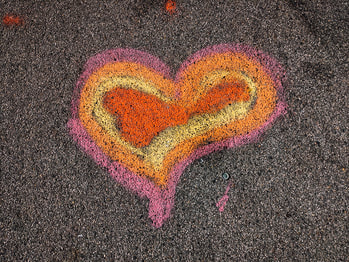 A large component to the passion behind my work as a health coach stems from my faith. I hope that regardless of your faith traditions, you can appreciate how our spiritual values and beliefs connect with our choices that impact our physical health. I believe God loves me just as I am, but he also loves me too much to let me stay as I am. God cares so much for me. His love for me informs how I care for myself. According to John 10:10, he desires that I live life to the full! I was recently asked to speak to a group of young moms. In preparation for my talk, I read 1 Corinthians 13 and it spoke to me in a fresh way. God is love and he desires, according to Matthew 22:39 that I love others as I love myself. Read through this next section with that in mind. God is love. He knows that if I love myself well, I’ll be better equipped to love others well. 4 Love is patient - am I patient with my progress on my health journey? and kind; - is this choice kind to my body - hint: Snickers are not kind to our bodies! love does not envy or boast; - do I envy others physical traits? it is not arrogant 5 or rude. It does not insist on its own way; - hmmmm it is not irritable or resentful; - do I resent what God has given me? 6 it does not rejoice at wrongdoing, but rejoices with the truth. 7 Love bears all things, believes all things, hopes all things, endures all things. I am so honored to be in a position where I am able to help people realize that because God cares for them, they are equipped to care for themselves. Because they are caring for themselves, they are equipped to better care for those around them. I just love that ripple effect! How does your faith inform your health choices?  Every year the American College of Sports Medicine creates a list of top fitness trends for that year. It is no surprise that since the beginning of the pandemic the trends have included outdoor activities, home gyms, and online exercise classes. Guess what made the list this year?! Drumroll please …. Health/Wellness Coaching! You can check out more information about all of the current trends here: https://www.acsm.org/education-resources/trending-topics-resources/acsm-fitness-trends In that article they define Health/Wellness Coaching: “This trend integrates behavioral science into health promotion and lifestyle medicine programs. Health/wellness coaching uses a one-on-one (and at times small group) approach with the coach providing support, goal setting, guidance and encouragement. The health/wellness coach focuses on the client’s values, needs, vision and short-and long-term goals using behavior change intervention strategies.” I’m so excited that more and more people are enjoying the benefit of having a qualified health coach in their corner supporting, guiding, and encouraging them as they establish new health habits. I consider it an honor to have been able to play a small role in the health transformation of so many individuals. I look forward to seeing this trend continue to rise! If you would like to learn more about what health coaching could look like for you, you can schedule a complimentary 15-minute discovery session here: https://www.picktime.com/KatieKolb Which of the top trends have you enjoyed recently?  I just love campfires. My husband knows that on my birthday, what I really want is a good campfire … and he usually delivers. And now, I can thank a campfire for starting me on this journey of providing my coaching services to private clients. During a COVID fireside get-together, a friend shared some of the struggles she was experiencing with her health and was explaining the medical journey that she had been on as a result. Honestly, it was nothing out of the ordinary, and a completely typical response and recommendation from her doctor. But I knew I could help if she was up for it. I explained that I love her and I’d support her either way, but if she was interested in working with me, I was pretty sure she could avoid all of the medical interventions and their possible side effects. She wasn’t convinced because she felt like she had tried everything she could on her own and had failed, but she was willing to give it a shot. Within three months she had achieved her first set of health goals, had established renewed hope in her own capabilities, and was encouraging me to offer my services to others like her! That was the beginning and we have yet to see where this will take me, but so far I am enjoying the ride! What about you? I would love to hear about a turn-around moment in your life! 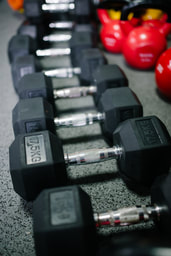 The topic of strength training seems to have come up a lot recently in my coaching calls. So, let’s talk about strength training for a few minutes, shall we? I have to start with a bit of a disclaimer. My husband is a Strength and Conditioning Coach at West Virginia University. In May of 2021, he was named a Master Strength and Conditioning Coach (MSCC) by the Collegiate Strength and Conditioning Coaches association (CSCCa). The honor is the highest given in the strength and conditioning coaching profession. My father-in-law was a Strength Coach for the Pittsburgh Steelers for many years and was widely known as one of the strongest players in the NFL. My knowledge pales in comparison to theirs … but I also have learned quite a lot from them both over the years. I know who to ask when I do have questions! Most of the clients I work with aren’t concerned about winning Division I Wrestling Tournaments or NFL games … but that doesn’t mean that strength training isn’t important for them. Check out this infographic from the American College of Sports Medicine that lists some of the conditions that research has shown will benefit from a strength training program. Most people that I work with are concerned that gaining muscle will slow their weight loss. Honestly, this could be true, but that doesn’t mean that it isn’t a good thing. Even if the weight loss slows, it is actually an indication that the body composition is changing … and that is a really good thing for overall health. More of your body weight being composed of muscle means you burn more calories even at rest. Muscle cells just need more energy. This means that being stronger will help with overall weight loss over time and is incredibly important for weight maintenance once a healthy weight has been achieved. Let’s talk about life in general. My heart hearts for people I see as they age struggling to get out of a chair or out of a car. That motion that they are struggling with is essentially a squat … one of the most basic lower body strength training moves. And if you are a woman, I get even more passionate about increasing muscle strength, because increased muscle strength increases both bone strength and balance. Fall prevention at its core! The fun thing is how much variety there is in strength training programs. With a little bit of trial and error, you are sure to find something that you at least won’t dread. And I’m willing to be over time you will be so proud of the results, you will almost look forward to your workouts. What are you willing to do today? 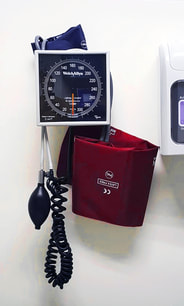 Disclaimer: Please discuss any blood pressure concerns with your physician. So, you find yourself with high blood pressure? You are not alone. According to the CDC, nearly half of Americans have hypertension … and of interest to me was the map on their website that shows West Virginia is one of the states with the most dense population of individuals with high blood pressure. Also, congratulations just for being on top of your health metrics enough to even know that you have high blood pressure. The CDC reports that 1 in 5 people are not even aware that they have this problem. But is it really a problem? According to a database collected in 2019, more than half a million deaths that year reported hypertension as a primary or contributing factor. Half a million. Yikes. What is so heartbreaking to me, is that I’m willing to bet that a large majority of those could have been prevented. First of all, if you have high blood pressure, you should be under a doctor’s care to control your hypertension with medication … but my goal as a health coach would be that through lifestyle interventions, you would be able to drop your blood pressure low enough that your doctor would be convinced to take you off of those medications. According to the Mayo Clinic, lifestyle interventions that work include:
My favorite thing about lifestyle interventions like these is that they not only help to lower blood pressure, but also help lower cholesterol, help with better weight management, help lower blood sugars ... they are just overall good for your health! What are you doing to support a healthy blood pressure? |
AuthorKatie Kolb - Health Coach Archives
May 2024
Categories |
 RSS Feed
RSS Feed